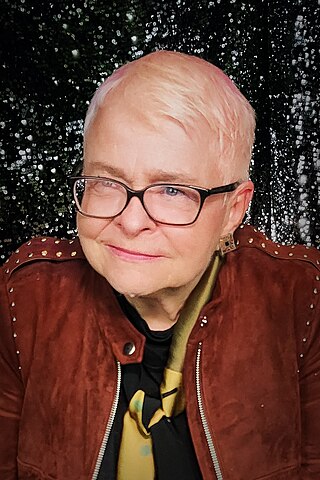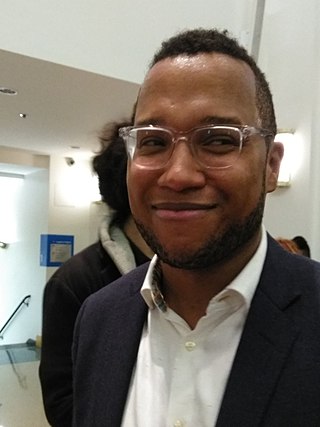External links
- The Flick at the Internet Off-Broadway Database
- The Flick at samuelfrench.com
| The Flick | |
|---|---|
| Written by | Annie Baker |
| Date premiered | March 12, 2013 |
| Place premiered | Playwrights Horizons New York City |
| Original language | English |
The Flick is a play by Annie Baker that received the 2014 Pulitzer Prize for Drama and won the 2013 Obie Award for Playwriting. [1] [2] The Flick premiered Off-Broadway at Playwrights Horizons in 2013.
The Flick debuted Off-Broadway at Playwrights Horizons on March 12, 2013, after previews from February 15, 2013. Sam Gold directed a cast featuring Alex Hanna (Skylar/The Dreaming Man), Louisa Krause (Rose), Matthew Maher (Sam), and Aaron Moten (Avery). Scenery and costumes were designed by David Zinn. The lighting design was by Jane Cox; the sound designer was Bray Poor. [3] Baker received a Harold and Mimi Steinberg Charitable Trust Commission, and the Steinberg Playwright Award. [4] The play closed on April 7, 2013. [5] [6]
It won the 2014 Pulitzer Prize for Drama. [2]
The play opened at the Off-Broadway Barrow Street Theatre on May 18, 2015, with the original cast and creatives. [7] A new cast began on September 1, 2015, featuring Kyle Beltran (Avery), Danny Wolohan (Sam), Brian Miskell (Skylar/The Dreaming Man) and Nicole Rodenburg (Rose). [8] The play closed on January 10, 2016. [9]
The play premiered in Chicago at the Steppenwolf Theatre Company running from February 4, 2016, to May 8. [10]
It ran from March 1, 2016, to April 24, 2016, at the Signature Theatre in Arlington, Virginia with Evan Casey (Sam), Laura C Harris (Rose), Thaddeus McCants (Avery), and William Vaughan (Dreaming Man/Skylar), and directed by Joe Calarco. [11]
The play was presented in London at the National Theatre from April 13, 2016, until June 15, 2016. Directed by Sam Gold, the cast featured Jaygann Ayeh, Sam Heron, Louisa Krause and Matthew Maher. [12]
It opened on January 21, 2019, at the Drachengasse theatre in Vienna, Austria. Directed by Joanna Godwin-Seidl and starring Daniel Annoh (Avery), Jason Cloud (Sam), Denise Teipel (Rose) and Jack Midgley (Skylar/Dreaming Man). [13]
It received its US west coast premiere at Shotgun Players in Berkeley, California. Running from August 22 to October 9, 2019, the play was directed by Jon Tracy and starred Chris Ginesi (Sam), Justin Howard (Avery), Ari Rampy (Rose), and Rob Dario (Skylar & Sleeping Man). [14]
The Flick is set in a run down movie palace near Worcester, Massachusetts and follows three underpaid movie ushers, Avery, Sam and Rose (who also runs the film projector), who do the humdrum and tedious labor necessary for keeping it running, including toiling to clean spilled soda from the floors. The show is a comedy of the mundane delivered in bits of conversation that might be considered insignificant. [2] Sam Gold said Baker's comedic writing was cleverly and surprisingly understated. Gold added that rhythm, meter and pace of the dialogue were cardinal to the comedy. [15] Running three hours, [16] the show has received complaints regarding its length. [17] While recognizing the dissonance, Playwrights Horizons artistic director Tim Sanford sent a letter to some subscribers, acknowledging the concern, but finding it outweighed by the praise of others. He concluded there was no need to edit the play down. [18]
StageGrade gives a median critics' rating for The Flick of B+ based on 22 reviews. Despite doubts about the play's length, the characters are said to be rich and the dialogue nuanced and entertaining. The lack of traditional theatricality is seen by some as a strength, and a weakness by others. [19]
Charles Isherwood, reviewing for The New York Times described Baker as one of the most impressive dramatists from the Off-Broadway scene of her generation and noted that she "writes with tenderness and keen insight". [20]
John Del Signore, reviewing the play in Gothamist , praised Baker "for capturing the halting, self-conscious vernacular of cerebral yet underachieving twenty-something suburbanites". [21] Although Del Signore noted that the significance of some of the elements of Baker's presentation were challenging to summarize, he noted that "[T]he three misfits blunder in and out of each other's isolated bubbles, making contact in any way they can to alleviate the oppressive drudgery of their tasks." [21]
Jesse Green acknowledged the need for brevity and clarity in his review for New York , and wrote:
No one does anything generally regarded as theatrical. ... So what does happen in The Flick? A lot of sweeping and mopping of the floor of a grotty old movie house near Worcester, Massachusetts. Also the tenderest drama—funny, heartbreaking, sly, and unblinking—now playing at a theater near you. ... It's uncanny; rarely has so much feeling been mined from so little content. Something's lost in the process, of course: brevity. [22]
In a Playbill article, Robert Simonson noted that despite its irksome lengthy, static actionlessness to some viewers the show was a splendid theatrical experience for serious theatregoers that wowed them with "existential minutiae" as presented by three performers who brought the themes to life. [17] Critics of The New York Times listed The Flick in 2018 as the third-greatest American play of the past 25 years. [23] The following year, writers for The Guardian ranked it fourth on a list of the best theatrical works since 2000. [24]
The play won the 2014 Pulitzer Prize for Drama; the Pulitzer committee stated that the play is a "thoughtful drama with well-crafted characters that focuses on three employees of a Massachusetts art-house movie theatre, rendering lives rarely seen on the stage." [2]
Baker was awarded the 2013 Susan Smith Blackburn Prize and the 2013 Obie Award for Playwriting for this play. [1] [25] The play received Drama Desk Award nominations for Outstanding Play, Outstanding Featured Actor in a Play (Aaron Clifton Moten) and Outstanding Set Design. [26] The play received 2013 Lortel Award nominations for Outstanding Play, Outstanding Director (Sam Gold), Outstanding Lighting Design (Jane Cox) and Outstanding Sound Design (Bray Poor). [27]
| Year | Award | Category | Nominee | Result |
|---|---|---|---|---|
| 2016 | Critics’ Circle Theatre Award [28] | Best New Play | Annie Baker | Won |

Donald Margulies is an American playwright and academic. In 2000, he won the Pulitzer Prize for Drama for his play Dinner with Friends.

Paula Vogel is an American playwright. She is known for her provocative explorations of complex social and political issues. Much of her work delves into themes of psychological trauma, abuse, and the complexities of human relationships. She has received the Pulitzer Prize as well as nominations for two Tony Awards. In 2013 she was inducted into the American Theater Hall of Fame.

Playwrights Horizons is a not-for-profit American Off-Broadway theater located in New York City dedicated to the support and development of contemporary American playwrights, composers, and lyricists, and to the production of their new work.
Will Eno is an American playwright based in Brooklyn, New York. His play, Thom Pain was a finalist for the Pulitzer Prize in Drama in 2005. His play The Realistic Joneses appeared on Broadway in 2014, where it received a Drama Desk Special Award and was named Best Play on Broadway by USA Today, and best American play of 2014 by The Guardian. His play The Open House was presented Off-Broadway at the Signature Theatre in 2014 and won the Obie Award for Playwriting as well as other awards, and was on both TIME Magazine and Time Out New York 's Top Ten Plays of 2014.

Lynn Nottage is an American playwright whose work often focuses on the experience of working-class people, particularly working-class people who are Black. She has received the Pulitzer Prize for Drama twice: in 2009 for her play Ruined, and in 2017 for her play Sweat. She was the first woman to have won the Pulitzer Prize for Drama two times.
Stephen Adly Guirgis is an American playwright, screenwriter, director, and actor. He is a member and a former co-artistic director of New York City's LAByrinth Theater Company. His plays have been produced both Off-Broadway and on Broadway, as well as in the UK. His play Between Riverside and Crazy won the 2015 Pulitzer Prize for Drama.

Bruce Norris is an American character actor and playwright associated with the Steppenwolf Theatre Company of Chicago. His play Clybourne Park won the 2011 Pulitzer Prize for Drama.

Matthew Maher is an American actor. He is best known for his roles in Bringing Out the Dead (1999), Dogma (1999), Jersey Girl (2004), Gone Baby Gone (2007), It's Kind of a Funny Story (2010), Grand Theft Auto V (2013) Captain Marvel (2019), Funny Pages (2022), Air (2023), and Our Flag Means Death (2022–2023).

Annie Baker is an American playwright, film director, and teacher who won the 2014 Pulitzer Prize for her play The Flick. Among her works are the Shirley, Vermont plays, which take place in the fictional town of Shirley: Circle Mirror Transformation, Nocturama, Body Awareness, and The Aliens. She was named a MacArthur Fellow in 2017. Her debut film Janet Planet released in 2023 to critical acclaim.
Stephen Karam is an American playwright, screenwriter and director. His plays Sons of the Prophet, a comedy-drama about a Lebanese-American family, and The Humans were finalists for the Pulitzer Prize for Drama in 2012 and 2016, respectively. The Humans won the 2016 Tony Award for Best Play, and Karam wrote and directed a film adaptation of the play, released in 2021.
Amy Herzog is an American playwright. She is known for her poignant and character-driven plays that explore themes of family dynamics, personal relationships, and the complexities of human experience. She has received a Drama Desk Award as well as a nomination for a Tony Award.

Circle Mirror Transformation is a play by Annie Baker, centered on drama classes at a community center in Vermont. The play opened Off-Broadway in 2009 and received the Obie Award for Best New American Play.
Jordan Harrison is an American playwright. He grew up on Bainbridge Island, Washington. His play Marjorie Prime was a finalist for the 2015 Pulitzer Prize for Drama.

Branden Jacobs-Jenkins is an American playwright. His plays Gloria and Everybody were finalists for the 2016 and 2018 Pulitzer Prize for Drama. His play Appropriate made his Broadway debut as a playwright in 2023 and earned him his first Tony Award. His additional plays include An Octoroon and The Comeuppance. He was named a MacArthur Fellow in 2016.

Lucas Hnath is an American playwright. He won the 2016 Obie Award for excellence in playwriting for his plays Red Speedo and The Christians. He also won a Whiting Award.
Sam Gold is an American theater director and actor. Having studied at Cornell University and Juilliard School he became known for directing both musicals and plays, on Broadway and Off-Broadway. He has received the Tony Award for Best Direction of a Musical, a Tony nomination for Best Director of a Play, and nominations for four Drama Desk Awards.

Martyna Majok is a Polish-born American playwright who received the 2018 Pulitzer Prize for Drama for her play Cost of Living. She emigrated to the United States as a child and grew up in New Jersey. Majok studied playwriting at the Yale School of Drama and Juilliard School. Her plays are often politically engaged, feature dark humor, and experiment with structure and time.
Cost of Living is a dramatic stage play written by Polish-born American playwright Martyna Majok. It premiered in Williamstown, Massachusetts, at the Williamstown Theatre Festival on June 29, 2016, and had an Off-Broadway engagement in 2017. The play won the 2018 Pulitzer Prize for Drama as well as two Lucille Lortel Awards, including Outstanding Play.

Heidi Schreck is an American playwright, screenwriter, and actress from Wenatchee, Washington. Her play What the Constitution Means to Me, which she also performs in, was a finalist for the 2019 Pulitzer Prize for Drama and Tony Awards for 2019 Best Play and Best Actress in a Play.
John is a play from Pulitzer Prize winning American playwright Annie Baker. The show premiered off-Broadway at New York's Signature Theatre Company in 2015, and was directed by Sam Gold. Time ranked John as one of its top 10 plays and musicals of 2015, where it took the number four spot. The play also reached number eight on the Hollywood Reporter's list of the "Best New York Theatre of 2015."